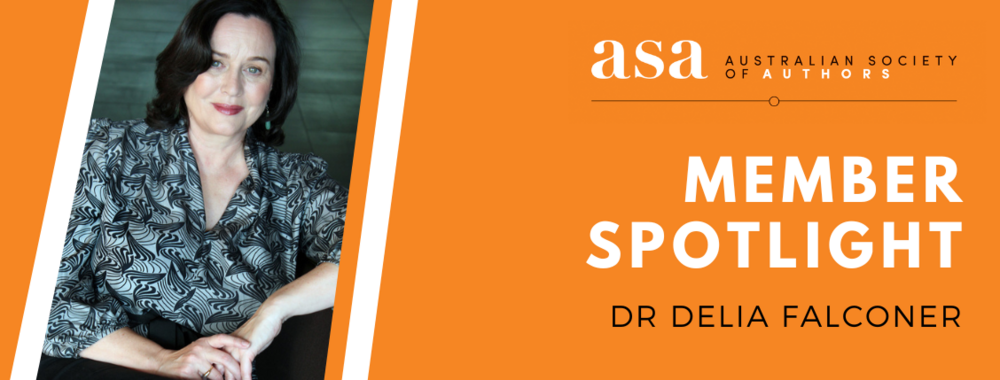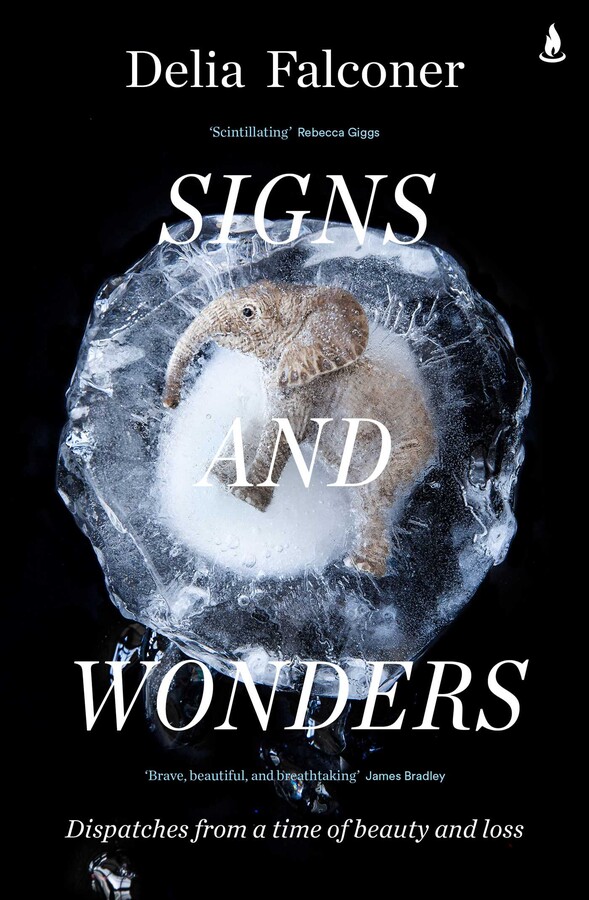20.01.23
Our January Member Spotlight features Dr Delia Falconer! Delia was recently announced as the winner of the 2022 Mark and Evette Moran Nib Literary Award for Signs and Wonders: Dispatches from a time of beauty and loss.
Dr Delia Falconer is the author of four books: two novels and two works of creative non-fiction. Her first novel, the bestselling The Service of Clouds, was shortlisted for major literary awards including the Miles Franklin, NSW Premier's Literary Awards, Victorian Premier's Literary Awards, and the Australian Booksellers' Book of the Year. Her second, The Lost Thoughts of Soldiers, was shortlisted among other awards for the Commonwealth Writers' Prize (Asia Pacific Division). Sydney is a personal history of her hometown, and was shortlisted for seven national awards in history, biography and non-fiction, and won the 2011 Nib CAL/Waverley Library Award for outstanding research.

What inspired you to begin a career in writing?
I didn’t think consciously about a career for a long time after I started to write. I’m not a planner. But was always a huge reader and always felt part of the world of books. When I enrolled in Arts/Law at the University of Sydney in the mid-eighties (the Law quickly fell by the wayside), I fell in with people who also loved to read. I think I owe them the most for opening my eyes to the boom in non-realist writing when I was most ripe to be inspired by it. One friend lent me Gabriel Garcia Márquez’s One Hundred Years of Solitude – a revelation! I was also reading through the English canon for my English Honours degree and watching so many films in the Fine Arts department, which took the place of more formal writing training. I joined the editorial collective of the literary magazine Hermes and around the same time began writing some stories I felt I could actually be proud of. I also became part of a very informal writing group, which used to meet down at the Harold Park Hotel in Glebe — I remember one of my friends physically pushing me up to read on the empty stage after the official readings were finished. In spite of my nerves, I really enjoyed it. I think that ignited something in me. But it was only later, when I was finishing my PhD in Cultural Studies in Melbourne, that I began to consider writing more seriously as an actual career. I think the constraint (which I loved) of writing the doctorate, and the exchanges with so many bright and brilliant people, freed my creativity. It also gave me the confidence to tell myself that I had finished a kind of book already so I might be able to write another.
However, if you want to go deeper. . . my Mum had always wanted to be a writer. She’d started studying journalism in Canberra in the 1940s but lost her means of support when the men returned from WWII and her job in Treasury was taken “back”. So many women of her generation were actively discouraged from achieving their artistic dreams. I’m sure a psychiatrist would say that part of my inspiration to write at least began with the impulse to take care of my mother’s unfinished business.
 What does it mean to you to be awarded the 2022 Mark and Evette Moran Nib Literary Award for Signs and Wonders: Dispatches from a time of beauty and loss?
What does it mean to you to be awarded the 2022 Mark and Evette Moran Nib Literary Award for Signs and Wonders: Dispatches from a time of beauty and loss?
I know we’re supposed to say that we don’t care about awards but it means a great deal! This was a very personal book so to think that it had been read with such attention and the judges had connected with it at such a deep level was a terrific affirmation of what I was trying to do. Writing about our impact on the planet is a hard sell — and so is publishing a book during pandemic lockdown. My hope is that the publicity around this prize has brought the book more readers who might be moved by a similar sense of urgency about the unfolding planetary crisis. All writers long to connect but this book feels so much less about me than the others and I feel such a debt to the subject matter itself.
What do you know now that you wish you'd known at the beginning of your career?
I think there’s something to be said for beginning a career in an unknowing way! I probably continue in some ways to be a bit romantic about writing and I’m not sure how it would have been to start writing in an age of social media with less freedom to experiment and make mistakes. I do wish I had known earlier that the trick to writing is, as Tim Winton has said in interviews, to never have an empty desk; to always have one or two pieces of writing going, even if they are on the very back burner. I’ve found it too easy over the years to lose momentum, and with momentum goes hope. If you disconnect with a project it’s all too easy to think its problems are unsolvable.
Why do you think it is important to be a member of the ASA?
I’m trying to think back to when I first joined. It was the late Rosie Scott who encouraged me, when she was on the board back in the nineties, telling me how important it was to all Australian writers. Obviously, the ASA has a huge role in the industry advocating for writers around fair rates, digital lending rights, and so on. I want to support this with my membership. But I also love the sense of belonging and remember how joining for the first time made me feel like I was able to call myself a writer. I’m now proud to be the ASA’s new representative on the Fellowships Advisory Board at the National Library, which has been a wonderful deepening of this relationship and a way of connecting with the organisation’s work.
Find out more about Dr Delia Falconer at www.deliafalconer.com.au
Keep up-to-date with ASA advocacy, support and advice
with our fortnightly newsletter.